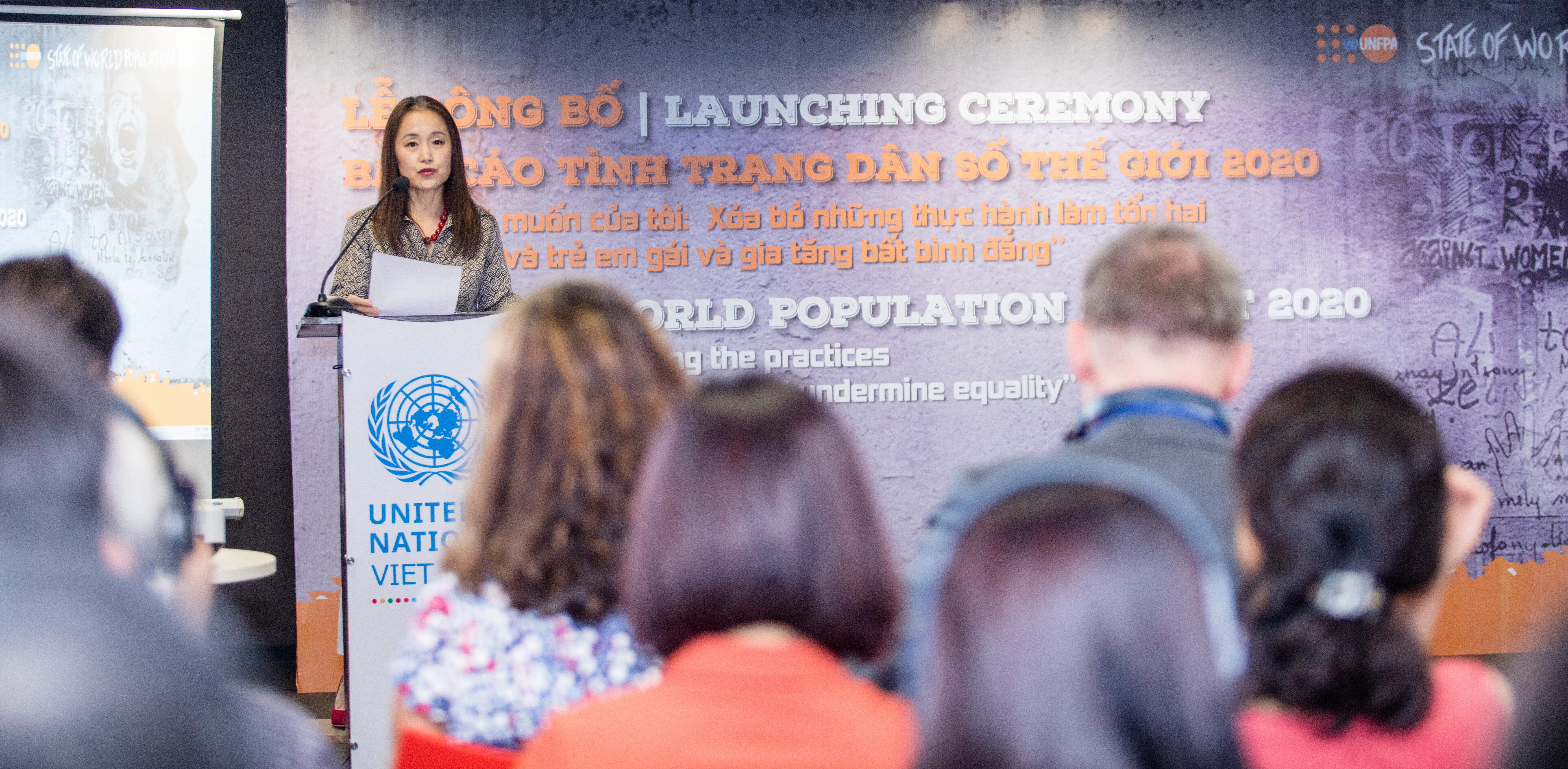Urgent, accelerated action needed to stop gender-biased sex selection and other practices that harm women and girls, according to UNFPA State of World Population report 2020
HA NOI, 17 July 2020 - Every year, millions of girls are subjected to practices that harm them physically and emotionally, with the full knowledge and consent of their families, friends and communities, according to the State of World Population 2020, launched today in Ha Noi by UNFPA, the United Nations Population Fund.
At least 19 harmful practices, ranging from breast ironing to virginity testing, are considered human rights violations, according to the UNFPA report, which focuses on the three most prevalent ones: female genital mutilation, child marriage, and extreme bias against daughters in favour of sons.
“Harmful practices against girls cause profound and lasting trauma, robbing them of their right to reach their full potential,” said UNFPA Executive Director Dr. Natalia Kanem.
This year, an estimated 4.1 million girls will be subjected to female genital mutilation. Today, 33,000 girls under age 18 will be forced into marriages, usually to much older men. Also, an extreme preference for sons over daughters in some countries has fueled gender-biased sex selection or extreme neglect that leads to their death as children, resulting in 140 million “missing females.”
Some harmful practices are waning in countries where they have been most prevalent. But because of population growth in these countries, the number of girls subjected to them will actually rise in the coming decades, if urgent action is not taken.
Decades of experience and research show that bottom-up, grassroots approaches are better at bringing change, the UNFPA report states. “We must tackle the problem by tackling the root causes, especially gender-biased norms. We must do a better job of supporting communities’ own efforts to understand the toll these practices are taking on girls and the benefits that accrue to the whole of society by stopping them,” said Dr. Kanem.
In Viet Nam, gender equality has improved over the past decades, but gender-biased sex selection as a harmful practice remains persistent in society. It has been identified as the major cause of an imbalance in the Sex Ratio at Birth (SRB) in Viet Nam. The skewed SRB in Viet Nam was first identified in 2004, and since 2005, the imbalance towards more boys has rapidly increased and reached 111.5 boys per 100 girls in 2019 as indicated in the 2019 Census, against the biologically “normal” SRB of 105. The State of the World Population Report 2020 estimates that for Viet Nam alone, 40,800 female births are estimated to be missing every year, as shown in the unbalanced SRB.
Addressing the national launch of the State of World Population 2020 at the Green One UN House in Ha Noi, Mr. Pham Ngoc Tien, Director of the Gender Equality Department, Ministry of Labour, Invalids and Social Affairs said: “Viet Nam has always considered gender equality as both a goal and a driving force for sustainable development. We have built and continued to improve the legal framework to better work in this important and relatively unfamiliar area. However, gender equality remains persistent in the society due to the influence of Confucianism. SRB imbalance is deeply rooted in the social norms and practices which reinforce son preference and the low value of women and girls. Bringing SRB the natural balance is also one of the goals of the National Strategy on Gender Equality for the 2021 - 2030 period that we are developing to submit to the Prime Minister for approval in 2020.”
Evidence shows that this demographic imbalance is a result of pre-natal sex selection based on son preference, which is deeply rooted in the traditional culture in many countries in the world including Viet Nam. Son preference is a powerful manifestation of gender inequality.
“We must put an end to son preference and the undervaluing of girls in our efforts to promote gender equality in the country. Viet Nam is making progress, but the progress must be accelerated within the context of the Decade of Action for Sustainable Development Goals (SDGs),” said Ms. Naomi Kitahara, UNFPA Representative in Viet Nam. “In this regard, men have a special role to play. I call on Vietnamese men to raise the value of girls and demand equal treatment and equal rights. In particular, we need men and boys to support this effort.”
At the launch, the Government of Viet Nam and UNFPA affirmed their strong commitment and called for urgent action to bring an end to this harmful practice. Together let’s join hands to stop son preference and gender-biased sex selection now, for our future generations.
-end-
Ms Nguyen Thi Hong Thanh | UNFPA Communications
Email: tnguyen@unfpa.org | Tel: 0913093363



